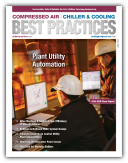Since opening its doors in 1965 in Calgary, Alberta, CFM Air Equipment has provided businesses with air compressors, compressed air dryers, compressed air filtration, blowers, vacuum solutions, compressed air piping and parts. Over the course of its history, the business changed hands a few times, ultimately being purchased in 2002 by Stan Sobczyk, an oil and gas consultant. His son, Steve Sobczyk, was finishing college and searching for the right career. Together, the father and son duo committed to learning the ins and outs of the industry, growing the company and offering customers the service they’d grown to expect.
Steve Sobczyk started his career at CFM Air Equipment as a Shipper/Receiver and worked his way up to Inside Sales Service Manager. As his father begins his retirement, Sobczyk is at last taking the reins and serving as President.
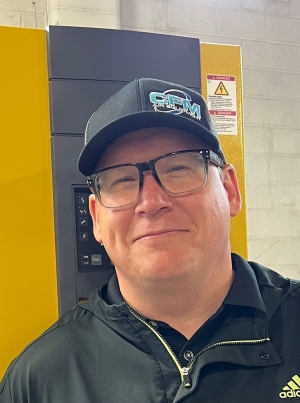
Steve Sobczyk, President of CFM Air Equipment.
Nearly 60 years since its inception, CFM Air Equipment has grown beyond its first location in Calgary. Today, the company has four branches providing parts and service coverage across Central and Western Canada, with locations in Calgary, Lethbridge, Regina and Winnipeg. The company has 21 employees, including one who was there at the start.
“Our motto is ‘Any make, any time,’ because of the experience we have across our service department. A key focus of ours is maintaining our team members and service techs. They have the knowledge and experience, so we’re able to service multiple brands and not be surprised by what we come across,” said Sobczyk.
Compressed Air Across Canadian Provinces
CFM Air Equipment is a Kaeser Compressors Canada distributor for Southern Alberta and Southern Saskatchewan, and a distributor for Chicago Pneumatic at its Manitoba branch. It works with clients of all sizes, and serves oil and gas, mining, hydro, agriculture, building maintenance, government, fertilizer and power industries. In addition to providing products, the company offers 24/7 service on all makes and models of compressed air equipment. Because compressed air needs differ from province to province, each branch has a unique clientele with distinct demands.
In Calgary, CFM Air Equipment serves many small- to medium-sized businesses that need equipment anywhere in the 5 to 50-horsepower (hp) range. While the company works with a variety of “mom and pop shops” from kitchen cabinet factories to granite companies, the mainstay at this branch are businesses that support the oil and gas industry such as metal fabrication shops. The diversity in Calgary allows CFM Air Equipment to not only focus on the compressed air business, but also provide alternative products and solutions such as vacuum systems, oxygen generation systems and low-pressure blowers.
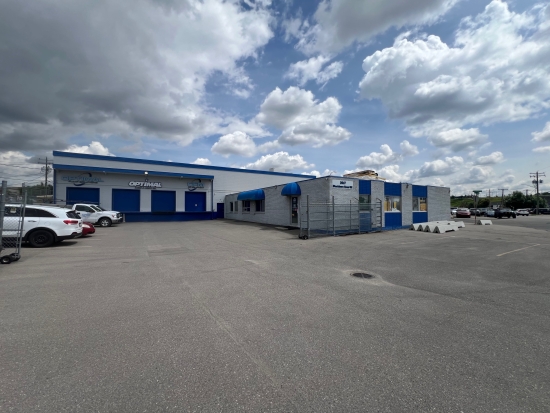
Calgary branch.
At the Regina location, agriculture is a top industry. Clean compressed air is key when it comes to agriculture. CFM Air Equipment must be sure of each site’s requirements and what level of compressed air is needed. This leads to a big involvement of its service team to ensure continuous air quality. It needs to look at the breakdown of food grade oil and how external factors such as room temperature and condition can shorten life span. It’s also important to maintain compressed air filtration to ensure air quality.
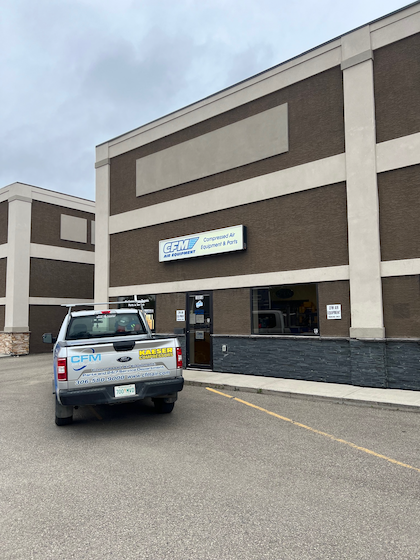
Regina branch.
Agriculture and food production are important industries for the Lethbridge branch. There are several large food processing and producing businesses in the area. The food industry in Lethbridge is growing quickly with many new plants in the works. This allows CFM Air Equipment to get in at the ground level with the engineers to determine plant requirements. The company can provide input on the design and focus on efficiencies including pressure requirements (low vs. high pressure), compressed air pipe design, as well as optimal storage.
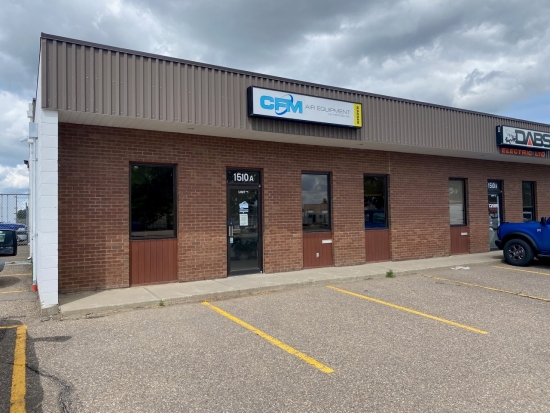
Lethbridge branch.
Manitoba’s economy is extremely diverse, not relying on any one sector. Within Manitoba there’s a varied, longstanding aerospace industry. Its large factories need larger systems. However, there are also many midsize to smaller companies, making this sector more unique. The industry is comprised of specialty parts manufacturing, aircraft maintenance and engine overhauling and testing. A training college prepares the workforce for this industry. Each of these locations uses compressed air – either low-pressure or high-pressure applications for the molding sector, general shop air use for the equipment and shop tools throughout the maintenance sector, and high-pressure storage for the engine testing sector. Vacuum molding and vacuum tables are used throughout the manufacturing process. Supply of equipment, maintenance and parts is critical to keep these units running.
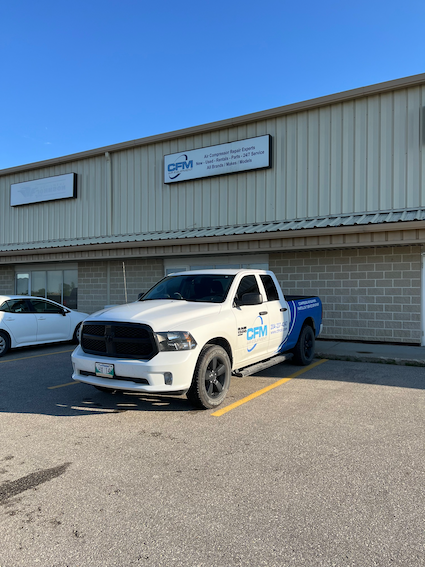
Manitoba branch.
Case study: Calgary Italian Bakery’s Compressed Air System Improves Performance and Saves MoneyIn July 2023, Calgary Italian Bakery asked CFM Air Equipment for assistance with its compressed air system, due to the inconsistent and generally poor performance it had been experiencing with its existing 50-hp air compressor. The bakery had seen significant downtime and expensive repairs (overheating and oil leaks) for quite some time with no resolution in sight. Past upgrades to the compressed air components had been made without determining the bakery’s real-time compressed air needs, so CFM Air Equipment recommended a Kaeser Air Demand Analysis. After running the sensing equipment on the system for two weeks, the company submitted the data for a Kaeser Energy-Saving System (KESS) report which provided recommendations for cost-effective improvements. To replace the single 50-hp baseload air compressor and seldom-used 30-hp backup air compressor, Kaeser presented three fixed-speed air compressor scenarios: one 50-hp machine and one 30-hp, one 40-hp and one 30-hp, or two 40-hp air compressors. According to the data, the bakery’s operational requirements could be met at the 85 percentile with one 40-hp air compressor active and another 40-hp on standby in lag mode. The calculated specific power consumption of this solution was in the middle of the three options at 19.91 kW/100 cfm with a maximum free air delivery (FAD) of 324 cfm. The KESS report detailed that the power savings realized with the installation of two 40-hp air compressors would amount to $3,500 per year. With this and service parts’ commonality in mind, the bakery chose to upgrade to two 40-hp air compressors. The compressor room was cleared in preparation for the installation and the Calgary Italian Bakery team did an excellent job of planning for the plumbing and ventilation of the two new air compressors. CFM Air Equipment installed and commissioned the new system components in January and February 2024, and the bakery has experienced satisfactory compressed air system performance ever since. “We were very happy we decided to go with the CFM Air Equipment team for this project. They came in first with the presentation of an air demand analysis, which would allow us to physically see our system demands and inefficiencies. Once this was completed, we sat down and reviewed which solution would provide us with the most energy savings, while also allowing for possible future expansion,” said Louis Bontorin, owner of Calgary Italian Bakery. “Overall, the peace of mind we now have with the new compressed air system allows us to focus on other projects and not worry that our compressor is going to shut down.” |
Conducting Compressed Air Energy Demand Audits
CFM Air Equipment’s business is comprised of 80% retrofit projects and 20% new projects. In both cases, the company takes a customer-centric approach. Team members take the time to learn what customers’ applications are and what kind of equipment they use.
“Often times, we get specs that say a customer needs X amount of air compressor horsepower, which leads us to ask, ‘Well, what kind of equipment are you using? What size of piping?’ All of these questions can lead us to determine a customer might not need that size of air compressor. Or maybe the variable speed drive air compressor they're asking for isn't the right type of application because they don't have varying demands in the system,” said Sobczyk.
“With our holistic approach, it’s almost always like a new installation for us – whether it's a retrofit or new project – because if it's a customer we've never been involved with, we're trying to narrow down what they have, what they use, what their demands are, what their needs are and just listen to them, as well.”
When beginning a new project, especially if it’s a retrofit, CFM Air Equipment conducts a compressed air system energy analysis or demand audit. This consists of:
- Installing compressed air monitoring equipment on the air compressors at the site, as well as pressure transducers, to determine the customer’s demand profile.
- Reviewing the options currently available for the customer.
- Examining pressure settings to determine how efficient the system is. Determining the lowest pressure settings to run the equipment.
- Checking the compressed air piping for rust buildup, black pipe or anything else that might cause flow restrictions or leaks within the system. This is done by completing a flow profile.
- Looking at the compressed air treatment to ensure there’s no differential across compressed air filters or inefficiencies such as stuck open auto drains to cause artificial air losses or incorrectly sized and located air receivers.
“We take an educational approach to help our customers learn about the efficiencies and inefficiencies with compressed air. A lot of times we aren't just selling equipment. We might be only selling a filter element or a more-efficient auto drain. For us, that's part of the process. It’s key for our development that we continue to help educate our customers,” said Sobczyk.
Questions to Ask for an Efficient Compressed Air SystemWhen discussing compressed air systems, CFM Air Equipment asks these questions on system efficiency.
|
The Cost of Compressed Air Leaks
Education is a large part of the company’s process. CFM Air Equipment believes in the importance of educating customers, so the team’s work goes well beyond sales calls. Common topics are the cost of compressed air leaks and the importance of monitoring, especially for larger systems.
“As soon as you mention the cost of compressed air leaks to customers, their eyes get wide – they don’t realize the cost of it,” Sobczyk said.
“For larger systems, continuous system monitoring is key. Kaeser has the Sigma Air Manager [SAM], which monitors the compressed air system and always works to balance the system to increase efficiency. It looks at which air compressors are running at what time, which ones shouldn't run and continuously learns. As we lean into those large systems, we encourage customers to invest in larger compressed air monitoring systems that can help them look at how things are running and almost give them a live price of what their compressed air costs.”
Honesty, Integrity and Fairness Drives CFM Air Equipment Forward
Over the course of its long history, CFM Air Equipment has had changes – expanding its operations, moving into larger buildings and extending its reach by adding three new branches – but one thing has always remained the same: the family-owned business’s strong values.
“We're open and honest in what we do. We always do business with integrity. If we ever do make a mistake, we're always willing to make it right,” said Sobczyk. “Education is a key element in our process and we’re committed to staying at the forefront of technological advancements in the compressed air field so we can relay that knowledge to our customers.”
For more information, visit https://cfmair.com.
To read similar Air Compressor Technology articles, visit https://www.airbestpractices.com/technology/air-compressors.
For expert presentations, visit our Webinar Archive Section dedicated to Air Compressor Technology at https://www.airbestpractices.com/magazine/webinars.


